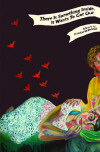There Is Something Inside, It Wants to Get Out
Most story collections pilfer their titles from a story within the book. But doesn’t that seem like favoritism, inaccurate representation, a sign that the stories are engaged in aggressive sibling rivalry rather than uniting in one cosmic birthing of art? Madeline McDonnell seems to think so. The title of her slim collection of three stories, There Is Something Inside, It Wants to Get Out, not only refuses to engage in thievery. The title voices the thing that holds these sister stories together, identifies the common emotional core between them, an undercurrent of desperation linked to inhabiting female skin. Each story’s protagonist struggles with a winged angst that flaps around inside her body, signaling a disturbance in her ability to enact her feminine self.
Most story collections pilfer their titles from a story within the book. But doesn’t that seem like favoritism, inaccurate representation, a sign that the stories are engaged in aggressive sibling rivalry rather than uniting in one cosmic birthing of art? Madeline McDonnell seems to think so. The title of her slim collection of three stories, There Is Something Inside, It Wants to Get Out, not only refuses to engage in thievery. The title voices the thing that holds these sister stories together, identifies the common emotional core between them, an undercurrent of desperation linked to inhabiting female skin. Each story’s protagonist struggles with a winged angst that flaps around inside her body, signaling a disturbance in her ability to enact her feminine self.
Wednesday, the protagonist of the first story, “Wife,” has several problems: her name, her bland academic fiancé Ben, her dissatisfaction with her PhD program, her inability to orgasm, her unhealthy attachment to her feminist mother’s expectations, ideology, and love. Wednesday’s mother says that marriage is legalized rape. Yet Wednesday wants to be a wife and mother, and when she sees a mother holding a newborn in a mini-mart, she thinks, “Someday Wednesday would have babies. She would swaddle them in pastel waffle-weaves, align them in the linen closet. She would take them out when she was lonely. She would never be lonely again.” This is a surreal way of thinking, illogical and childish, a sign that her mother and academia have stunted her growth. Wednesday is intellectually advanced, but intellectual ways of being—disciplined, structured, dryly analytic—have made her a permanent child, submissive and obedient to scholarly institutions, a creature trained for thinking, who feels no physical or sexual pleasure, and relies on memories of cuddling with her mother instead.
The trauma of existing in this impossible state leads to a breakdown, which McDonnell paints again in surrealist tones. Here, Wednesday remembers a Dalí exhibit from a museum in Spain:
she sees Dalí’s dresser women now, normal but for drawers in their stomachs. In the museum, Wednesday had wished for drawers of her own […] If she had drawers, she thought then, she would lift her shirt and open them. She would throw forks and knives and coffee saucers and grapefruit spoons at the melty paintings, and at the warped oblong windows, at the chattering Catalan children on a field trip. And at Ben, who was up ahead again, nodding solemnly at a wall.
This strange fantasy enacts a rebellion against both femininity and feminism, against husbands, children, and intellectual institutions. Wednesday uses items of domestication as weaponry, withdraws them from her body to stop their ceaseless rattling noise. This is a story steeped in intellect. Yet, it is beautiful, honest, and raw, warning of the danger in erring too far in the opposite direction of traditional female roles and creating a sterile, emotionless life.
The desperation of the second story “Physical Education” sounds in the same key as “Wife,” but takes on different problems and themes. In it, fifteen-year-old Mary struggles with gym class and cancer. After she undergoes surgery and chemo, her father attends gym to make sure she’s not overexerting herself. He ends up taking over, first coaching from the sidelines, then appearing in workout clothes and setting up tournaments between teams for which he is a key player. Mary feels obliterated. The cancer has turned her into a bald martyr whose father participates more easily in adolescence than she does. She withdraws and embraces her illness. Symptoms and procedures become lovers. Mary’s surgery is a one-night stand. Her IV, which she wheels around, whose hand she holds, is her rebound lover. At night, she lies in bed with her tumor and listens to it breathe. She says, “There are hummingbirds in my stomach. Nausea, nausea, I was once so lonely, but now there is you.” Illness eases her loneliness and give her an ethereal frailty that thrills her morbid obsessions. This wrenching story comments more on the isolation of girlhood than on a child’s experience with cancer. How empty one must feel to mourn so despairingly a tumor that’s receding and giving back one’s health.
The third story in the collection “Trouble” finishes the trio by looping back to the theme of motherhood. Here, Lucy, newly pregnant, develops an addiction to crashing cars. Like the book’s other protagonists, Lucy has an uncomfortable angst pitted deep in her stomach, seeded by the kind of trauma women sometimes cannot escape. I won’t give more of the final story away than that, but will leave you with these breathtaking lines that close the book: “If she shuts her eyes she’ll break. Through streetlight, through birdsong, through telephone lines; through leaves like babies’ hands waving. If she wants to get there—where the air is wild and quiet and private as any ocean—all she has to do is keep them closed.” There are a bounty of passages in this book that achieve this beauty. It may be a thin volume physically, but in content and aesthetics McDonnell’s collection is rich.





